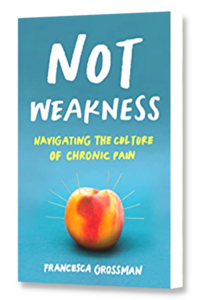Expert interviews reveal similar lives of silent suffering, confronts stigmas

Newton, MA – Francesca Grossman is no stranger to pain. In her 20s and 30s she endured thyroid cancer, Crohn’s disease, and other autoimmune conditions that left her feeling isolated in her suffering. Now Francesca shares her personal experiences and those of 20 other women with chronic pain in her new book, “Not Weakness: Navigating the Culture of Chronic Pain” (April 18th, 2023, She Writes Press), in which she challenges the toxic culture of shame, humiliation, and fear that surrounds pain, particularly in women.
With over 50 million people in the US living with chronic pain and almost 70% of them being women, Francesca set out to find answers to one big question; where are these people? Through her expert interviews with 20 remarkable women who share similar lived experiences, Francesca reveals a heartbreaking shared truth: chronic pain is a daily struggle for many women that leaves them with feelings of guilt, embarrassment, and anxiety about the future.
“Not Weakness” confronts the silencing and harmful stigmas women in pain experience in our society. Imbued with a deep respect for the women who tell their stories in its pages, as well as a healthy skepticism of the healthcare world and how it can stifle and ignore women in pain, it is a galvanizing memoir about living and loving with chronic pain.
Not Weakness: Navigating the Culture of Chronic Pain
Francesca Grossman | April 18, 2023 | She Writes Press | Memoir
Paperback | 978-1647424770 | $17.95
 Francesca Louise Grossman is a writer and writing instructor. Her work has been published in The New York Times, Brain, Child Magazine, The Manifest Station, Ed Week, Drunken Boat, and Word Riot, among others. She runs writing retreats and workshops internationally and leads an annual intensive workshop at The Harvard Graduate School of Education. She has a BA and MA from Stanford University and a doctorate from Harvard University in education. Her acclaimed book “Writing Workshop: How to Create a Culture of Useful Feedback” is used in universities and workshops all over the world. Francesca lives in Newton, MA, with her husband and two children. Find out more about her at https://francescagrossmanbooks.com/.
Francesca Louise Grossman is a writer and writing instructor. Her work has been published in The New York Times, Brain, Child Magazine, The Manifest Station, Ed Week, Drunken Boat, and Word Riot, among others. She runs writing retreats and workshops internationally and leads an annual intensive workshop at The Harvard Graduate School of Education. She has a BA and MA from Stanford University and a doctorate from Harvard University in education. Her acclaimed book “Writing Workshop: How to Create a Culture of Useful Feedback” is used in universities and workshops all over the world. Francesca lives in Newton, MA, with her husband and two children. Find out more about her at https://francescagrossmanbooks.com/.
In an interview, Francesca Grossman can discuss:
- The culture of shame and silence that is associated with chronic pain
- How she hopes this memoir will empower others to share their lived experiences with autoimmune diseases that cause chronic pain
- How the patriarchy contributes to the historic underdiagnosing and believability of pain-related diseases in women
- Having meaningful relationships (partner, mother, friend) when in pain
- How her experiences with healthcare taught her to be her own self-advocate and her experiences with the wellness industry
- The empowering and affirming experiences of building community through interviewing other women with similar stories
- Her experience as a writing teacher and how she uses it to create a narrative non-fiction story
Advanced praise for Not Weakness
“This is the book we all need; whether or not we suffer from chronic pain ourselves. It’ll offer us a deeper understanding and let’s be real: we all know people suffering with chronic pain. Francesca Kaplan Grossman writes beautifully. It’s a pleasure to read every sentence, yes, even inside a book on pain. She brings love and beauty and deep empathy. Get this book for yourself and your people.”
—Jennifer Pastiloff, author of On Being Human
“So much more than a personal memoir, “Not Weakness” is a meditation on womanhood, endurance, and daring to exist in a culture nominally obsessed with wellness and hustle yet deeply uncomfortable with those whose bodily realities reveal the limits of those ideals—limits which all of us, inevitably, will encounter. Francesca Grossman beautifully weaves together stories of chronic pain to illuminate how our embodied experiences are at once irreducibly unique and universally inescapable.”
—Natalia Mehlman Petrzela, historian and author of Fit Nation: The Gains and Pains of America’s Exercise Obsession
“A powerful and poignant account of the experience of living with chronic pain. Francesca neither looks for pity nor hides the raw truths—this book will prove a comfort to anyone living with a condition others don’t understand, and a must-read for anyone supporting someone who does. Simply put, this book is a gift.”
—Michelle Miller, author of The Underwriting and The Fairer Sex Collection
“Intertwining her moving personal journey with the stories of other women living with chronic pain, Grossman sheds light on the stigma our culture places on pain and offers insight into the sense of connection, community, and, yes, hope, that may emerge when those who suffer share their stories— and are heard.”
—Meg Donohue, USA Today best-selling author of You, Me, and the Sea
“Not Weakness is a much-needed examination of a pressing and urgent problem that faces not just modern healthcare, but also every one of us. Women’s pain is everybody’s pain. Or should be. Francesca Grossman, and the brave stories she’s collected, show us that it’s never too late to focus on what hurts us most and find a way through it to something entirely new.”
—Laurel S. Braitman, New York Times best-selling author of Animal Madness
An Interview with
Francesca Grossman
1. How has your relationship with chronic pain inspired you to initiate this conversation around it with others?
I have lived with chronic pain for my entire adult life. It is a reality that has caused me to feel deficient, isolated and alone, because, the truth is, I don’t know many people in my everyday life who live in pain like I do. Considering over 50 million people in the United States suffer in this way (almost 70% of them women), this doesn’t make a lot of sense. Where are all these people, (these women)? In the past few years, I have dedicated myself to trying to understand why we are all suffering alone. I spoke to women all over the country about their experience with chronic pain. Though we all have unique experiences, similar themes of silencing, shame, isolation and loneliness arise again and again. Learning this has been both humbling and freeing. What I have learned is when we talk to each other about our shared experiences, some of those feelings of isolation and deficiency lift. When we know about others, we feel less abnormal. While the pain may always be with us, I offer this book as a glimpse into my life and the lives of other women who live in pain, with the hope that it will make us all feel less alone.
2. What do you want readers who do not have chronic pain to learn from your memoir? Is there a specific lesson that you hope readers (regardless of their personal relationship with chronic pain) will learn?
It’s so hard to have close relationships when you are in pain, because there is always something in the way. People in pain continuously have a piece of their mind concentrating on their pain – how to lessen it, how to avoid more of it, how to live a “normal life” with it, day after day. Often, we look like we aren’t trying, we are in a bad mood, or we are avoiding social or societal obligations. Often, people who don’t live in pain will offer us solutions or remedies, advice on healing or stories of other people who improved because of XYZ. Most likely, your loved one in pain has tried what you are offering or something similar. Without a doubt, your loved one is desperate to feel less pain, and has done everything in their power to lessen it. I want readers to understand that accepting we will live with chronic pain forever is not a sign of defeat. It is not giving up. It is not a weakness. In fact, it’s brave and strong and can be life changing. Acceptance might be the only remedy worth taking.
3. How can someone initiate a change in this culture of silencing, shame, humiliation, and fear associated with chronic pain?
There are many small things that everyone can do to turn the ship a bit. We must believe people (especially women) when they express they are in pain. We must support them without pity, and understand that their daily lives are difficult but not impossible. We must make accommodations for people in pain – whether that is flexible work schedules, carpools and support to doctor’s visits, access to mental health professionals and credible wellness centers or much more. We must remind people in pain that it is not their fault, and we must mean it.
4. You are on a quest to find out why individuals with chronic pain choose to remain silent. Can you share something you have learned in the process of writing this memoir that you were not aware of beforehand?
While I have often felt silenced by medical professionals, I was shocked to hear how common (and brutal) it is.
In the 2001 study, The Girl Who Cried Pain, the authors tell us that women are “more likely to be treated less aggressively in their initial encounters with the health-care system until they prove that they are as sick as male patients, a phenomenon referred to in the medical community as ‘Yentl syndrome.’” The interviews I conducted confirmed this experience.
But it goes even deeper. According to the New York Times piece, Women Are Calling Out ‘Medical Gaslighting,’ “Women say doctors frequently blame their health problems on their mental health, weight, or a lack of self-care, which can delay effective treatment . . . research suggests that women are twice as likely as men to be diagnosed with a mental illness when their symptoms are consistent with heart disease.”

A former award-winning journalist with national exposure, Marissa now oversees the day-to-day operation of the Books Forward author branding and book marketing firm, along with our indie publishing support sister company Books Fluent.
Born and bred in Louisiana, currently living in New Orleans, she has lived and developed a strong base for our company and authors in Chicago and Nashville. Her journalism work has appeared in USA Today, National Geographic and other major publications. She is now interviewed by media on best practices for book marketing.

